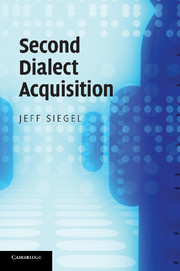Book contents
- Frontmatter
- Contents
- List of figures
- List of tables
- Acknowledgements
- List of abbreviations
- 1 Introduction
- 2 Attainment in naturalistic SDA
- 3 Acquiring a second dialect
- 4 Differential attainment: Age effects and linguistic factors
- 5 Additional individual and linguistic factors
- 6 The difficulty of SDA
- 7 SDA in classroom contexts
- 8 Educational approaches for SDA
- 9 Explaining the results and taking further steps
- Notes
- References
- Index
4 - Differential attainment: Age effects and linguistic factors
Published online by Cambridge University Press: 07 September 2010
- Frontmatter
- Contents
- List of figures
- List of tables
- Acknowledgements
- List of abbreviations
- 1 Introduction
- 2 Attainment in naturalistic SDA
- 3 Acquiring a second dialect
- 4 Differential attainment: Age effects and linguistic factors
- 5 Additional individual and linguistic factors
- 6 The difficulty of SDA
- 7 SDA in classroom contexts
- 8 Educational approaches for SDA
- 9 Explaining the results and taking further steps
- Notes
- References
- Index
Summary
In addition to examining the extent of D2 learning, most studies of SDA also aim to determine some of the factors that lead to learners differing in their overall attainment, and to some D2 features being acquired more successfully than others. In fact, determining these factors is often the main focus of some SDA studies.
This chapter introduces some of the factors relating to both learners and particular linguistic features, and then concentrates on age of acquisition and two related linguistic factors, linguistic level and complexity of rules. These factors intersect to affect the degree of ultimate attainment. The chapter concludes with a discussion of some possible reasons for these effects.
Individual and linguistic factors
Why do some subjects in the studies described inChapter 2 attain native-like usage of D2 variants while others do not use any D2 variants at all? Various non-linguistic factors have been examined to account for such differences in individuals' performance. Some of these factors are connected with intrinsic characteristics of the learners, such as their age. Others have to do with the learning context – age of arrival in the new location or when D2 acquisition began, often called age of acquisition, and length of residence in that location. Another set of factors is associated with the complex notions of motivation to acquire the D2 and attitudes towards it and its speakers.
Information
- Type
- Chapter
- Information
- Second Dialect Acquisition , pp. 83 - 100Publisher: Cambridge University PressPrint publication year: 2010
